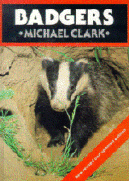 |
DNA bank to catch badger killers

29 November 2004 - BBC News
A database of badger DNA is being created to snare criminals who set dogs on the
animals and dig-up setts. The RSPCA project, which will cover England and Wales,
is the first of its kind for a wild species. It is hoped the database will help
bring successful prosecutions against people who dig and bait the animals.
DNA can already be taken from a crime scene but there has been no reference
database to prove the evidence - such as hair - is actually from a badger.
Experts hope to take around 400 samples from across the country to represent the
badger population. The RSPCA has commissioned Wildlife DNA Services Ltd to set
up the database of hundreds of badger samples. Barry Fryer, chief superintendent
at the Special Operations Unit at the RSPCA, said: "The database should
significantly improve our chances of successfully prosecuting diggers and
baiters.
"In the past, we have been unable to proceed with cases through insufficient
evidence linking the defendants to particular badgers. With the extra
supplementary evidence the DNA profiling will provide, we are confident that the
cases we put forward will withstand the scrutiny of a court of law."
DNA samples of badger hair, blood or faeces can be taken from a crime scene. Dr
Rob Ogden, of Wildlife DNA Services, said: "At present the human DNA profiling
system used to help criminal forensic investigations makes use of large
databases. Our aim is to build up an equivalent database for badger DNA which
will assist the RSPCA in proving matches and securing prosecutions."
Genetic techniques for identifying individual badgers have already been
developed. These profiles have been successfully used to identify individual
badgers within three social groups with a 99% success rate. When enough samples
are collected, scientists will begin profiling and recording them to form a
national map of profiles from badger social groupings. RSPCA Special Operations
inspectors have been given DNA testing kits which they will use to collect
samples for the database.
Under the Protection of Badgers Act 1992, it is illegal to interfere with a
badger sett. The maximum sentence is six months' imprisonment and a £5,000 fine.
For more information, please click the following link:
| Michael Clark
book |
 |
This is a superb book about badgers by Michael
Clark. His immense knowledge of badgers really shines through. Click here to buy:
2017 edition or
2010 edition
or
2010 edition
|
| External News |
|
We have provided links to stories from external news
organisations so you can follow the media interest in badgers, and see who
writes on the subject. We do not endorse external authors. |
 |
|
